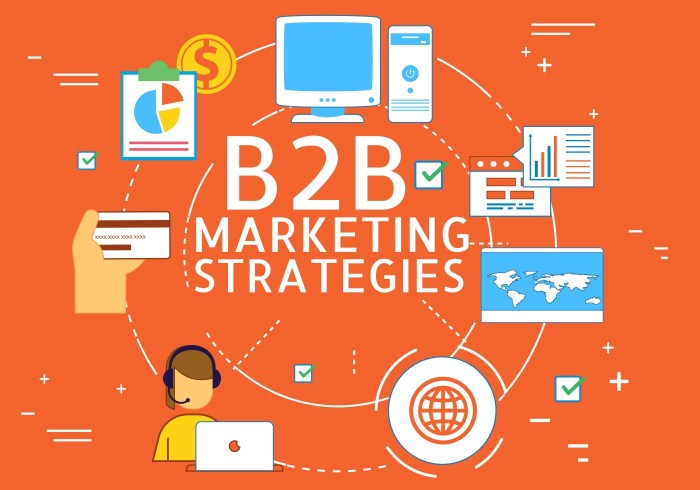Creating B2B Marketing Campaigns is a crucial aspect of business growth, requiring careful planning and execution. Dive into this comprehensive guide to learn the ins and outs of crafting successful campaigns that drive results.
Understanding B2B Marketing Campaigns
B2B marketing campaigns involve businesses promoting their products or services to other businesses rather than individual consumers. These campaigns are tailored to meet the specific needs and challenges faced by businesses in the industry.
Importance of B2B Marketing Campaigns
B2B marketing campaigns are crucial for businesses as they help in building brand awareness, generating leads, and ultimately driving sales. By targeting other businesses, companies can establish valuable partnerships and secure long-term contracts.
- Creating brand credibility: B2B marketing campaigns help in showcasing the expertise and credibility of a business within a particular industry.
- Generating quality leads: By focusing on businesses as the target audience, B2B campaigns can attract high-quality leads that are more likely to convert into customers.
- Building relationships: B2B marketing campaigns allow businesses to nurture relationships with other companies, leading to long-term partnerships and collaborations.
Examples of Successful B2B Marketing Campaigns
“Intel’s “The Museum of Me” campaign was a highly successful B2B marketing campaign that showcased the power of data visualization for businesses. The interactive experience allowed users to create a virtual museum of their social media profiles, highlighting Intel’s capabilities in data processing and visualization.”
| Company | Campaign | Results |
|---|---|---|
| Salesforce | “Dreamforce” | Increased brand visibility and lead generation |
| Adobe | “Adobe Summit” | Education on digital marketing trends and Adobe products |
Target Audience Research
Identifying the target audience is crucial in B2B marketing campaigns as it helps tailor strategies and messages to resonate with the right people. Understanding the needs, preferences, and pain points of the target audience is key to creating effective campaigns that drive results.
Methods for Conducting Target Audience Research
- Utilize market research surveys to gather demographic and psychographic data about your audience.
- Monitor social media channels and online forums to understand what topics are trending and what issues are important to your target audience.
- Interview existing customers to gain insights into their decision-making process and what factors influence their purchasing decisions.
- Utilize analytics tools to track website traffic, email open rates, and other metrics to understand how your audience interacts with your content.
How Understanding the Target Audience Influences Campaign Strategies
By truly understanding your target audience, you can create personalized messaging that speaks directly to their needs and challenges. This can lead to higher engagement rates and better conversion rates for your campaigns. Additionally, knowing your audience allows you to choose the most effective channels for reaching them and tailor your content to maximize impact.
Developing Campaign Objectives
When it comes to B2B marketing campaigns, setting clear and measurable objectives is crucial for success. These objectives help guide the direction of the campaign and provide a roadmap for achieving desired results.
Campaign objectives should always align with the overall business goals to ensure that every marketing effort contributes to the company’s success. By setting specific objectives, businesses can focus their resources and efforts on activities that will drive the most impact.
Setting Specific Objectives
- Increasing lead generation by 20% within six months
- Improving brand awareness among target audience by 30% by the end of the year
- Driving a 15% increase in sales revenue through the campaign
Crafting Compelling Content

Content plays a crucial role in B2B marketing campaigns as it is the vehicle through which businesses communicate their message, showcase their expertise, and engage with their target audience. Compelling content can capture the attention of potential clients, build trust, and ultimately drive conversions.
Tips for Creating Engaging and Relevant Content
Creating engaging and relevant content for the target audience is essential for the success of B2B marketing campaigns. Here are some tips to help you craft compelling content:
- Understand your audience: Conduct thorough research to understand the needs, pain points, and preferences of your target audience.
- Provide value: Offer valuable insights, solutions, and resources that address the challenges faced by your audience.
- Use a mix of content formats: Experiment with different types of content such as blogs, videos, infographics, and case studies to keep your audience engaged.
- Optimize for : Ensure your content is optimized for search engines with relevant s and meta descriptions to improve visibility.
- Personalize your content: Tailor your messaging to resonate with different segments of your target audience and make them feel understood.
Importance of Storytelling in B2B Marketing Content, Creating B2B Marketing Campaigns
Storytelling is a powerful tool in B2B marketing content as it helps create an emotional connection with the audience, making your brand more memorable and relatable. By weaving stories into your content, you can humanize your brand, showcase your values, and differentiate yourself from competitors. Stories have the ability to captivate and inspire, leaving a lasting impression on your audience and driving them to take action.
Selecting the Right Channels: Creating B2B Marketing Campaigns
When it comes to distributing B2B marketing campaigns, selecting the right channels is crucial for reaching your target audience effectively. Different channels like email, social media, and content marketing each have their own strengths and weaknesses, so it’s important to choose wisely based on your campaign objectives and the preferences of your target audience.
Key Channels for Distributing B2B Marketing Campaigns
- Email: Email marketing is a popular and effective channel for reaching B2B audiences. It allows for personalized messaging and direct communication with potential leads.
- Social Media: Social media platforms like LinkedIn, Twitter, and Facebook can be valuable for engaging with B2B audiences, sharing content, and building brand awareness.
- Content Marketing: Creating valuable and informative content that resonates with your target audience can help establish your brand as a thought leader in your industry.
Comparing Channel Effectiveness
- Email: Offers direct communication but may be seen as intrusive if not personalized.
- Social Media: Allows for engagement and sharing but may require more effort to stand out in a crowded digital space.
- Content Marketing: Establishes credibility and thought leadership but requires consistent effort to produce high-quality content.
Choosing Suitable Channels
- Consider the preferences of your target audience: If your audience is active on a particular social media platform, focus your efforts there.
- Align channels with campaign objectives: If your goal is to generate leads, email marketing may be more effective than social media.
- Track and analyze results: Monitor the performance of each channel to determine which ones are delivering the best results and adjust your strategy accordingly.
Measuring Campaign Performance

In order to determine the effectiveness of B2B marketing campaigns, it is crucial to track various metrics that provide insights into the performance of the campaign. Analytics play a key role in evaluating the success of a campaign by providing data-driven insights that can help marketers make informed decisions. Utilizing tools and methods to measure campaign performance effectively is essential for optimizing future campaigns and maximizing ROI.
Essential Metrics for Tracking Campaign Performance
- Conversion Rate: This metric measures the percentage of leads that result in a desired action, such as a purchase or form submission.
- ROI (Return on Investment): Calculating the ROI helps determine the profitability of the campaign by comparing the costs to the revenue generated.
- Click-Through Rate (CTR): CTR indicates the percentage of people who clicked on a link within the campaign, providing insights into the effectiveness of the messaging and call-to-action.
- Lead Generation: Tracking the number of leads generated from the campaign helps evaluate its impact on sales pipeline and revenue.
Importance of Analytics in Evaluating Campaign Success
Analytics play a crucial role in evaluating campaign success by providing actionable insights based on data. By analyzing metrics such as conversion rates, CTR, and ROI, marketers can identify what is working well and what needs improvement. This data-driven approach helps optimize campaigns for better results and ensures that marketing efforts are aligned with business goals.
Tools and Methods for Measuring Campaign Performance Effectively
- Google Analytics: A powerful tool that provides in-depth insights into website traffic, user behavior, and campaign performance.
- Marketing Automation Platforms: Platforms like HubSpot and Marketo offer advanced analytics capabilities to track and measure campaign performance.
- A/B Testing: Testing different elements of a campaign, such as messaging or design, can help determine what resonates best with the target audience.
- Social Media Analytics: Platforms like Facebook Insights and LinkedIn Analytics provide valuable data on engagement, reach, and conversions from social media campaigns.